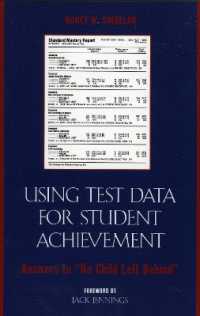Full Description
This open access book presents recent research and hot topics in the field of real estate science in Japan. It features carefully selected English translations of peer-reviewed papers and excellent articles published in the Japanese Journal of Real Estate Sciences, as well as papers presented at the Japan Association of Real Estate Sciences (JARES) annual conference.
The topics covered include market analyses of vacant houses, policies for reuse of vacant houses, property tax policy, issues of land for which the owners are unknown, disaster and real estate values, the siting optimization plan and its influence on real estate, big data and ICT technology for the real estate business, and public real estate management.Real estate science in Japan has developed in step with international research in the fields of law and economics, regional science, civil engineering, environmental science, architectonics, and related areas. At the same time, it has evolvedinto a unique discipline that focuses on policy-oriented practical science with arguments for the reform of outdated laws, regulations, and traditional customs. Asian countries are currently growing rapidly and are catching up with developing countries. The lessons learned and know-how accumulated by JARES is helpful for practitioners and policymakers not only in Japan, but also in other Asian countries.
Contents
Part 1. Real Estate and the Legal System.- Chapter 1. Introduction: Real Estate and the Legal System Japan.- Chapter 2. Legal issues of land plots with unknown owners.- Chapter 3. The efficiency of the titling system: Perspectives of Economics.- Chapter 4. Land plots with unknown owners: Causes and legal measures - The necessity for a thorough reduction of transaction costs.- Chapter 5. Realities and Challenges of Land Issues in the Era of Depopulation.- Chapter 6. The Negative Effect Factors of the Land Acquisition System for Profit-Oriented Enterprises in order to Promote Economic Growth.- Chapter 7. Empirical analysis on the system revisions of judicial real estate auctions - Comparison with general real estate trading.- Part 2. Real estate tax system and real estate market in Japan.- Chapter 8. Introduction: Real estate tax system and real estate market in Japan.- Chapter 9. Professional Practices in Fixed Assets Valuation and Assessor Education in North America -- Suggestions for Japan.- Chapter 10. The Optimal Reform about Property Tax.- Chapter 11. Requirements for the application of exemption from real estate acquisition tax due to purpose of use -- Based on the acquisition of land usage for a school site by an Incorporated Educational Institution.- Chapter 12. Dual agency, commission levels, and the effect on sale price in residential real estate market: a questionnaire survey on real estate brokers in Japan.- Chapter 13. A study on the relation between residential land value and the distance to the center of the Tokyo Metropolitan Area (1970-2016).- Chapter 14. Study on Premium Rent of Refurbished Apartments Based on Bayesian Modelling Using Stated Preference Data of the Tenants.- Chapter 15. Feasibility Evaluation for Condominium Reconstruction by Means of the Application of Discriminant Analysis on Real Estate Data.- Chapter 16. Factor Analysis of Rent Using Space Syntax Measures. - Comparative Analysis by Building Usearound Shibuya Station.- Part 3. City planning and new technology.- Chapter 17. Introduction: City planning and new technology.- Chapter 18. Guiding urban facilities and functions in compact mixed-use development from the perspective of residents.- Chapter 19. Compact city corresponding to the advanced transport systems.- Chapter 20. Current status and issues for urban (regional area) formulation of the Location Normalization Plan: the case of Niigata City.- Chapter 21. The Overview and Legal Issues Regarding Real Estate Tech.- Chapter 22. Proposal of System for Calculating Sky View Factor Using Google Street View.- Chapter 23. Frontiers of Computer Vision Technologies on Real Estate Property Photographs and Floorplans.







